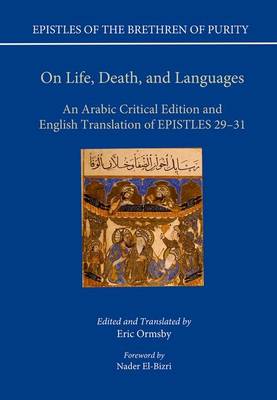
- Retrait gratuit dans votre magasin Club
- 7.000.000 titres dans notre catalogue
- Payer en toute sécurité
- Toujours un magasin près de chez vous
- Retrait gratuit dans votre magasin Club
- 7.000.0000 titres dans notre catalogue
- Payer en toute sécurité
- Toujours un magasin près de chez vous
On Life, Death, and Languages
An Arabic Critical Edition and English Translation of Epistles 29-31
Eric Ormsby
84,45 €
+ 168 points
Description
The Ikhwān al-Ṣafāʾ (Brethren of Purity), the anonymous adepts of a tenth-century esoteric fraternity based in Basra and Baghdad, hold an eminent position in the history of science and philosophy in Islam due to the wide reception and assimilation of their monumental encyclopaedia, the Rasāʾil Ikhwān al-Ṣafāʾ (Epistles of the Brethren of Purity). This compendium contains fifty-two epistles offering synoptic accounts of the classical sciences and philosophies of the age; divided into four classificatory parts, it treats themes in mathematics, logic, natural philosophy, psychology, metaphysics, and theology, in addition to didactic fables. The three epistles in this volume are among the most accessible and appealing of the Brethren of Purity's treatises. In their down-to-earth yet elegant style, they present age-old teachings on three fundamental issues: the nature of death, and what this means for body and soul; the truth about pleasure and pain, both physical and spiritual; and the multiplicity of human languages and their origins, beginning with a discussion of natural and mechanical sounds and proceeding to human speech. Rich with metaphors and illustrative parables, here we find outstanding examples of adab in the Arabic literary tradition, refined and genial philosophical discourses that reveal a high degree of sophistication and considerable literary flair.
Spécifications
Parties prenantes
- Auteur(s) :
- Traducteur(s):
- Editeur:
Contenu
- Nombre de pages :
- 384
- Langue:
- Anglais
- Collection :
Caractéristiques
- EAN:
- 9780198858140
- Date de parution :
- 26-05-21
- Format:
- Livre relié
- Format numérique:
- Genaaid
- Dimensions :
- 155 mm x 236 mm
- Poids :
- 839 g

Les avis
Nous publions uniquement les avis qui respectent les conditions requises. Consultez nos conditions pour les avis.






